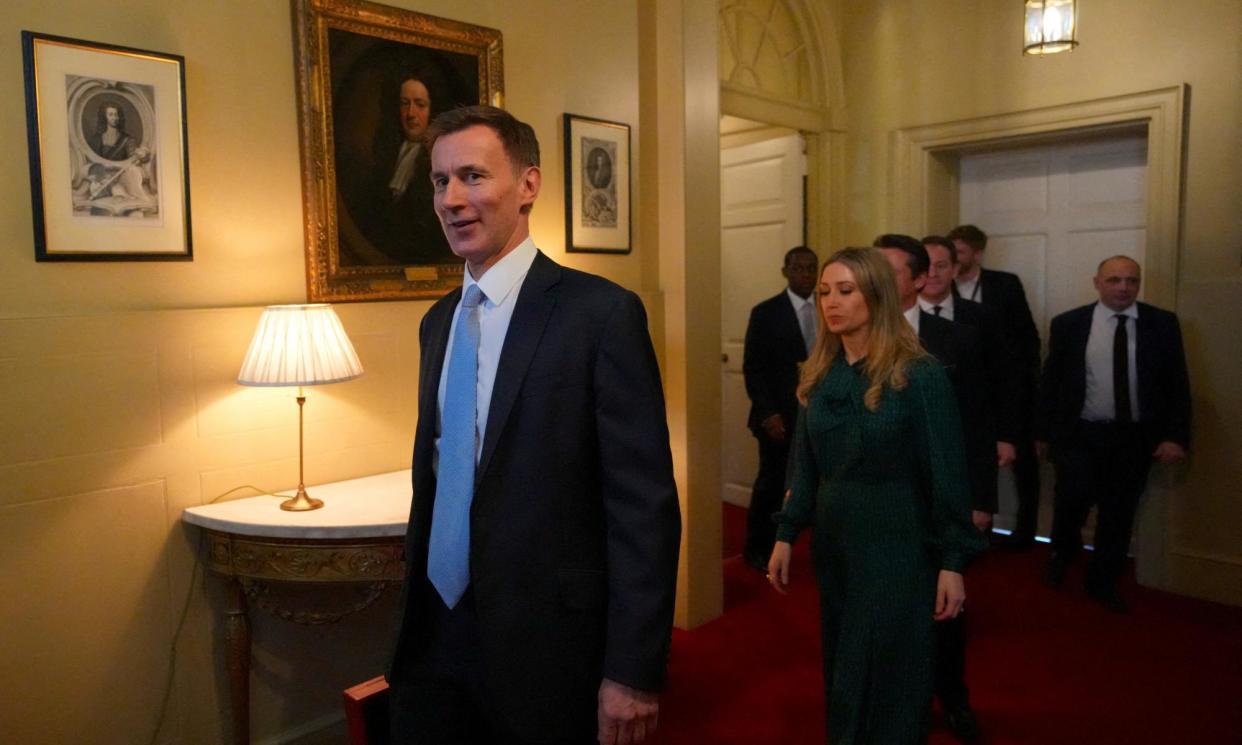‘It won’t shift the polls’: Tory MPs rue budget that lacked pre-election pizzazz

Jeremy Hunt has spent weeks managing expectations over potential tax cuts in his spring budget, with Tory MPs desperately searching for ways to avoid election defeat as household finances buckle under a record tax bill and the cost of living crisis.
As the chancellor’s fiscal headroom shrank in the run-up to the budget, so did his plans for spending in areas such as housing and defence, as he promised he would not “take any risks” with the British economy despite all the political pressure.
Yet despite the difficult economic backdrop, he found enough money on Wednesday to offer a further 2p off national insurance, which, he said, would save the average family £900 a year when combined with the previous 2p cut announced last autumn.
As possibly the Tories’ last budget before the general election, this could have been a moment for Hunt to talk directly to the country, giving voters a big electoral offer and framing the choice they face at the ballot box.
But despite expectations, it felt like more of a staging-post than a jumping-off point for an election campaign – an attempt to convince the public that the Tories wouldn’t take any more risks with the economy, with just enough in it to keep a backbench rebellion at bay.
“It’s not as sexy as I would’ve wanted but it gives us leeway to go further before the next election,” said one Tory MP afterwards. Another suggested that Hunt was sticking his head in the sand, saying: “This budget will not shift the polls.”
“It was probably the best we could responsibly do on the day,” a third added. “He successfully hammered home the message that Labour have no plan.”
Hunt’s initial 2p national insurance cut, introduced in January, didn’t move the polls and Tory MPs were sceptical the latest cut would land any differently. “It didn’t work last time round, what makes them think it will be any different this time?” one said.
Many backbenchers would have preferred Hunt to announce an income tax cut, which, though more expensive, would have benefited older people and landlords as well as workers, and potentially had greater political cut-through.
As chancellor in 2022, Sunak announced that income tax would be cut from 20p to 19p this April. Others cite his pledge during the Tory leadership contest to cut the basic rate to 16p.
Instead, what they got was a flash of ankle from Hunt on an ambition to abolish national insurance entirely, at some unspecified point in future, in the light of his remark that he wanted to “end the unfairness” of “double taxation”, even though this would cost about £50bn a year.
After the budget, government insiders claimed that it was not intended to be a gamechanger. Few Tory MPs, already anxious about trailing so far behind in the polls, expect that it will be enough to save them at the election.
The figures from the Office for Budget Responsibility did not help the fatalistic mood, showing that Hunt’s cuts had failed to prevent taxes rising to the highest level since 1948 while living standards were on course to be lower in five years than was feared last autumn.
The forecasts also rely on fuel taxes rising, which has not happened since 2011, and there is no real growth in public spending per head over the next five years, with departments predicted to see real-terms budget cuts of 2.3% a year from 2024-25.
Tory aides focused on one slim glimmer of light – that figures for real household disposable income were better than they were expected to be in last November’s forecast. They are hoping that the public actually start to feel better off as the year goes on.
And Hunt repeatedly punched a Labour bruise in his statement: that the public still doesn’t know what a Keir Starmer government would do. “They don’t have a plan for public services,” he told jeering Labour MPs. “So why not listen to ours?”
He also pinched Labour’s plan to end non-dom tax status for foreign earners – despite the Tories’ longstanding criticism of the plan, which they had previously argued would cost £350m – potentially leaving Rachel Reeves a £2bn-plus hole to be plugged in her plans.
The government confirmed there would be no spending review to allocate cash to government departments until after the next election, putting off that tough decision to another day, and probably leaving it up to a future Labour government.
In a round of broadcast interviews later on Wednesday afternoon, Hunt insisted that the budget was “absolutely not” the party’s last throw of a dice before an election.
“We have produced a budget that shows that we are turning a corner,” he added. Yet few of his colleagues believe they can reverse what feels like an inevitable fate – and the public appear to agree.

 Yahoo News
Yahoo News 
